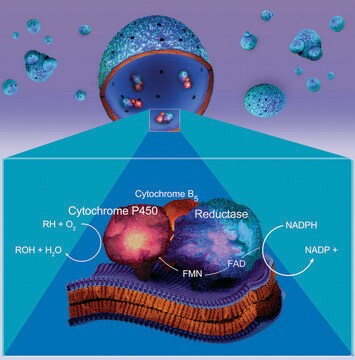Recommended Products
biological source
human
recombinant
expressed in Pichia pastoris
form
dry powder
shipped in
dry ice
storage temp.
−70°C
Gene Information
human ... CYP2B6(1555)
Biochem/physiol Actions
CYP2B6, encodes a member of the cytochrome P450 superfamily of enzymes. The cytochrome P450 proteins are monooxygenases which catalyze many reactions involved in drug metabolism and synthesis of cholesterol, steroids and other lipids. This protein localizes to the endoplasmic reticulum and its expression is induced by phenobarbital. The enzyme is known to metabolize some xenobiotics, such as the anti-cancer drugs cyclophosphamide and ifosphamide. Transcript variants for this gene have been described; however, it has not been resolved whether these transcripts are in fact produced by this gene or by a closely related pseudogene, CYP2B7. Both the gene and the pseudogene are located in the middle of a CYP2A pseudogene found in a large cluster of cytochrome P450 genes from the CYP2A, CYP2B and CYP2F subfamilies on chromosome 19q.
Cytochrome P450 is a heterogeneous family of isozymes whose primary function is to oxidize small molecules, both as a function of intermediary metabolism (e.g., fatty acids) and to detoxify exogenous compounds (drugs or toxins). Some isoforms have narrow substrate specificity, while others are promiscuous.
Features and Benefits
CypExpress 2B6 is a permeabilized and stabilized dried yeast powder preparation containing full length, unmodified, human CYP2B6 and recombinant human NADPH oxidoreductase. Using proprietary processes, CypExpress are expressed in Pichia yeast. Following optimal expression, the cells are inactivated, permeabilized and dried to a fine powder. CypExpress retains the cellular mechanisms to provide the P450 enzymes with the energy and cofactors to continue to function for long experiments, and can generate larger amounts of metabolite than mammalian microsomes or other genetically engineered expression systems.It is designed for rapid screening of drug metabolites and for scaling up metabolite generation.
Legal Information
CypExpress is a trademark of Oxford Biomedical Research
Storage Class Code
11 - Combustible Solids
WGK
WGK 1
Flash Point(F)
Not applicable
Flash Point(C)
Not applicable
Choose from one of the most recent versions:
Certificates of Analysis (COA)
Lot/Batch Number
Sorry, we don't have COAs for this product available online at this time.
If you need assistance, please contact Customer Support.
Already Own This Product?
Find documentation for the products that you have recently purchased in the Document Library.
Customers Also Viewed
Esther Ng et al.
Environmental research, 140, 95-101 (2015-04-04)
Polychlorinated biphenyls (PCBs) are a group of man-made environmental pollutants which accumulate in humans with adverse health effects. To date, very little effort has been devoted to the study of the metabolism of PCBs on a genome-wide level. Here, we
Jingbao Liu et al.
Biochemistry, 55(13), 1997-2007 (2016-03-17)
Using a combined structural and biochemical approach, the functional importance of a recently described peripheral pocket bounded by the E-, F-, G-, and I-helices in CYP2B4 and 2B6 was probed. Three series of 4-substituted-7-alkoxycoumarin derivatives with -H, -CH3, or -CF3
Jackson K Mukonzo et al.
Pharmacogenomics, 15(11), 1423-1435 (2014-10-11)
We investigated the effects of rifampicin-based anti-TB treatment on plasma efavirenz exposure and the implications of CYP2B6 genotype. Antiretroviral therapy-naive Ugandan HIV patients without (n = 157) or with TB coinfection (n = 106) were enrolled and treated with efavirenz-based
Qingkun Song et al.
Scientific reports, 5, 16775-16775 (2015-11-26)
This study investigated interactive effects of CYP2B6 genotypes and liver metastasis on the prognosis of metastatic breast cancer patients who received combined chemotherapy of docetaxel and thiotepa. Totally 153 patients were retrospectively genotyped rs8192719 (c.1294 + 53C > T) and
Kaoru Inoue et al.
The Journal of biological chemistry, 283(16), 10425-10432 (2008-02-28)
The nuclear receptor CAR (constitutive active/androstane receptor) is a drug-sensing transcription factor, regulating the hepatic genes that encode various drug-metabolizing enzymes. We have now characterized the novel regulatory mechanism by which the signal molecule EGR1 (early growth response 1) determines
Our team of scientists has experience in all areas of research including Life Science, Material Science, Chemical Synthesis, Chromatography, Analytical and many others.
Contact Technical Service






